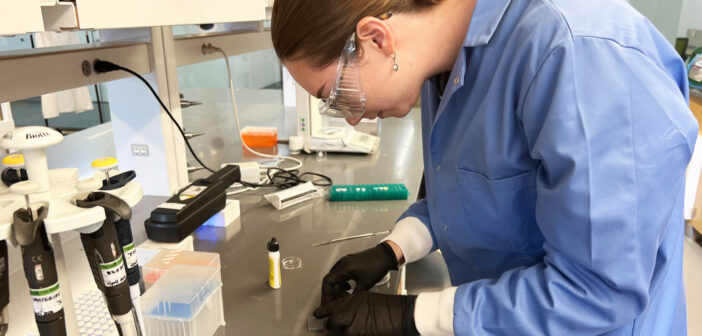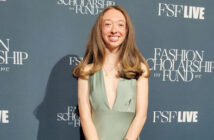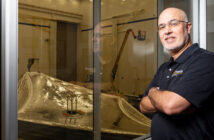Donning her long blue lab coat and with her hair pulled back into a bun, Josie Krepps, ‘24, slides her safety goggles over her glasses and snaps a black latex glove onto each hand.
She turns on an ultraviolet light and gathers her tweezers, mold, pipette, polymers and photoinitiator. She’s ready to create a hydrogel that will soon be home to hundreds of stem cells.
The amount of each polymer and chemical Krepps works with must be measured precisely, so she writes out her procedures and follows them like recipes, excitedly awaiting the final result.
“It’s like cooking,” Krepps said, looking back on her childhood watching The Great British Bake Off and testing out new recipes with her mom.
Krepps is an IDEAS major and English minor from northern Virginia and is currently working on an independent food science research project in a multi-use lab in the Health, Science and Technology Building.
Her research, which focuses on cultivating proteins synthetically, is making strides toward a progressive future in ethical and sustainable food production.
Krepps joined the interdisciplinary research team as a sophomore after she received an email advertising the Clare Boothe Luce Research Scholarship. Financed by a grant from the Henry Luce Foundation, the scholarship offers up to two years of funding to women in STEM pursuing an independent research project.
Once accepted, Krepps was matched with two professors in the department of chemical and biomolecular engineering, Kelly Schultz and Mark Snyder, who work on cultivated beef research.
After a meeting with Snyder, Krepps said she knew she wanted to be a part of the research team.
Now, her role is to work with hydrogels that are “very long and thin, like hair” to encapsulate cells and support their survival.
She said it’s fundamental to understand what cells are doing in their environment, so she studies how the cells move and organize in hydrogels. This provides insight into how they would act in a larger piece of cultivated meat.
The ultimate goal is to create a piece of muscle tissue from thousands of fibers.
Her favorite task, Krepps said, is staining the cells in the hydrogel she created. She uses this process to see how many cells are alive — dead cells turn red and living ones turn green — with a target survival rate of at least 90%.
Krepps also uses cell staining to assess cell morphology and structure, observing the hydrogels through a microscope to see whether the stained cells have organized in a specific way or are randomly dispersed.
Her interest in clean food production fuels her passion for the fight against climate change.
“A huge part of the food industry is inventing snack products, and I love them so much, but it’s just not what I want to do,” Krepps said. “So I kind of combined food science with sustainability and landed in this alternative protein space.”
Krepps said she first discovered her passion for the environment after she watched “The Biggest Little Farm,” a documentary about a husband and wife who buy a farm in the hopes of learning regenerative farming techniques and ultimately growing everything they cook.
Now, Krepps said her favorite part of working in a lab is knowing her work will help protect animal welfare and lessen the growing problem of antibiotic-resistant populations the way the couple did on their California farm in the documentary.
Fighting against climate change and expanding her own personal skill set, Krepps spends at least 10 hours in the lab per week, which she said she likes to space out into small increments because she has “a low stamina for lab work.”
In addition to technical lab skills, Krepps said her time working on her project has increased her independence.
“I’m not paired with a grad student, so all of my work is completely my own,” Krepps said. “And whatever progress I make is (based on) how much time I put in, which is rewarding.”
Lindsey Ocheltree, a second-year doctorate student in chemical engineering, is in the same lab group as Krepps. The two met a little over a year ago.
Ocheltree said she liked Krepps as soon as they met, noting her work ethic, intelligence and self-motivation.
“I was really surprised with how independent she was as an undergrad, and I was extremely impressed,” Ocheltree said. “I actually thought she was a grad student at first with how much independence she had.”
Krepps said she is not usually a patient person, but she has learned the skill more by facing challenges in the lab.
One morning, when Krepps came into the lab, she found out all the cells she had been working with had been contaminated by another researcher’s project. They had to be thrown away.
She said from the start, researchers must understand that failures like this are imminent so they don’t get discouraged early on.
“You’re gonna fail probably more than 80% of the time,” Krepps said.
Though she said she is not immune to frustration when problems arise, Krepps is not one to back down from a challenge.
Sasha Rabeno, ‘24, said Krepps is one of her close friends, and if she could describe her in one word it would be “headstrong.”
When applying to Lehigh, Krepps was nervous about the lack of food science courses offered at Lehigh but she said she had a “gut feeling” that Lehigh was the right choice for her.
Krepps said she is glad her IDEAS major allows her to balance her schedule with various courses instead of focusing too heavily on one subject. She said she didn’t want to choose between the P.C. Rossin College of Engineering and the College of Arts and Sciences.
She said she takes many fundamental biology and chemistry courses that will help her down the road but also enjoys writing.
Krepps refers to herself as “brutally honest” and said she doesn’t hesitate to tell people what she thinks, and Rabeno agrees.
“She’s very opinionated in a good way,” Rabeno said. “She’s not afraid to tell you what she’s thinking, or if she thinks you’re doing something stupid, she’ll say you’re doing something stupid.”
She said when she’s relaxing she enjoys building keyboards and cooking, both of which require the ability to follow directions or recipes precisely.
Krepps said she enjoys that type of process and being able to see a specific end result, whether it be a hydrogel full of stained stem cells, a colorful keyboard or a pot of homemade soup.






Comment policy
Comments posted to The Brown and White website are reviewed by a moderator before being approved. Incendiary speech or harassing language, including comments targeted at individuals, may be deemed unacceptable and not published. Spam and other soliciting will also be declined.
The Brown and White also reserves the right to not publish entirely anonymous comments.